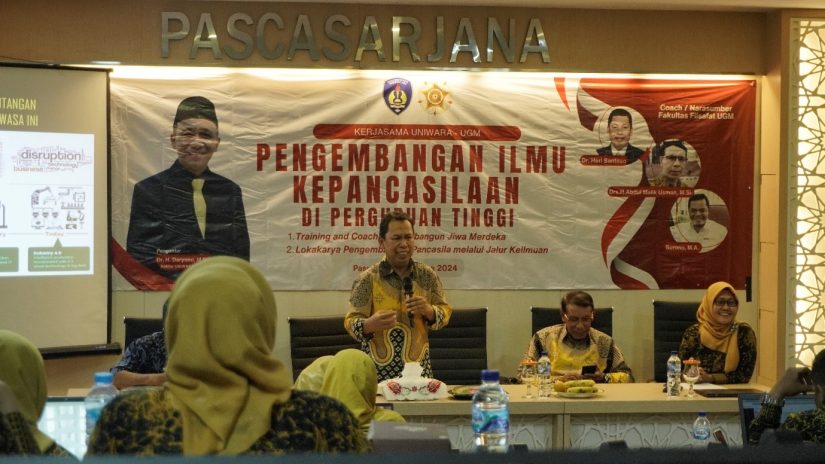
The Faculty of Philosophy at Universitas Gadjah Mada (UGM) has once again reaffirmed its strategic role in supporting the implementation and internalization of Pancasila values, particularly within higher education.
On Saturday, August 24, a team of UGM faculty members conducted a workshop on the Development of Pancasila Studies in Higher Education at the Postgraduate Auditorium, Building C Samiadi, Universitas PGRI Wiranegara (Uniwara) in Pasuruan, East Java. The event was attended by lecturers from various study programs at the university.
The workshop was part of a community service initiative by UGM’s faculty team, which included Dr. Heri Santoso, M.Hum., Drs. H. Abdul Malik Usman, M.Si., and Drs. Imam Wahyudi, as well as PhD students from the UGM Philosophy Department, including Surono, M.A. The event also marked the continuation of a collaboration between Uniwara and UGM’s Faculty of Philosophy, which was initiated in 2023.
Dr. Heri Santoso, the head of the community service team, emphasized the importance of this activity, which highlights one of Pancasila’s core functions as a foundation and orientation for the development of science. “Pancasila is not only the foundation of the state and the nation’s ideology but also the basis and orientation for the development of science. Therefore, in 2023, we began to lay the groundwork for operational-level development, seeking partners who share UGM’s vision,” he explained.
Heri elaborated that the 2023 program focused on the application of Pancasila in education, research, publication, and community service. This year’s theme shifts towards the development of knowledge, especially in the fields of social sciences, culture, and religion.
“Ideally, to develop sciences based on Pancasila, scholars and lecturers should begin with studies in the philosophy of science and Pancasila philosophy, as both are branches of philosophy that underpin this discourse,” he explained.
In his presentation, Heri discussed several contemporary challenges in the social sciences and humanities, including what he referred to as the confusion, lack of sovereignty, and stagnation within some fields of knowledge in Indonesia. He also explored the relevance of the philosophy of science in academic development and highlighted the pioneering ideas of scholars who have contributed to the development of Pancasila-based knowledge, such as Pancasila Philosophy, State Science and Pancasila Law by Notonagoro, Pancasila Economics by Mubyarto, and Prophetic Social Science by Kuntowijoyo.
“There is deep concern over the state of science in Indonesia. Concepts, models, scientific communities, and institutions have already been established, but the movement’s continuity has been interrupted,” he said.
Dr. Abdul Malik Usman, also part of the workshop, discussed how Pancasila substantially aligns with the values taught in Islam, particularly as outlined in the Madinah Charter created by the Prophet Muhammad (PBUH) based on the guidance of the Qur’an. “According to Cak Nur, the Madinah Charter, which contains 47 articles, essentially revolves around five principles: Godliness, Humanity, Unity, Wisdom and Consultation, and Social Justice,” he explained.
The workshop is expected to be a key moment for the internalization of Pancasila values within academic fields in Indonesian higher education. The anticipated outcomes of the event include teaching materials, modules, educational videos, and academic works by lecturers that integrate and internalize Pancasila values.
“This year, UGM continues to support Uniwara in independently implementing the internalization of Pancasila values and becoming a driving force for other universities in Indonesia. We hope that the results of this workshop will strengthen the implementation of Pancasila values in Uniwara’s teaching process and spread these best practices to other universities,” said Dr. H. Daryono, M.Pd., Rector of Uniwara.
